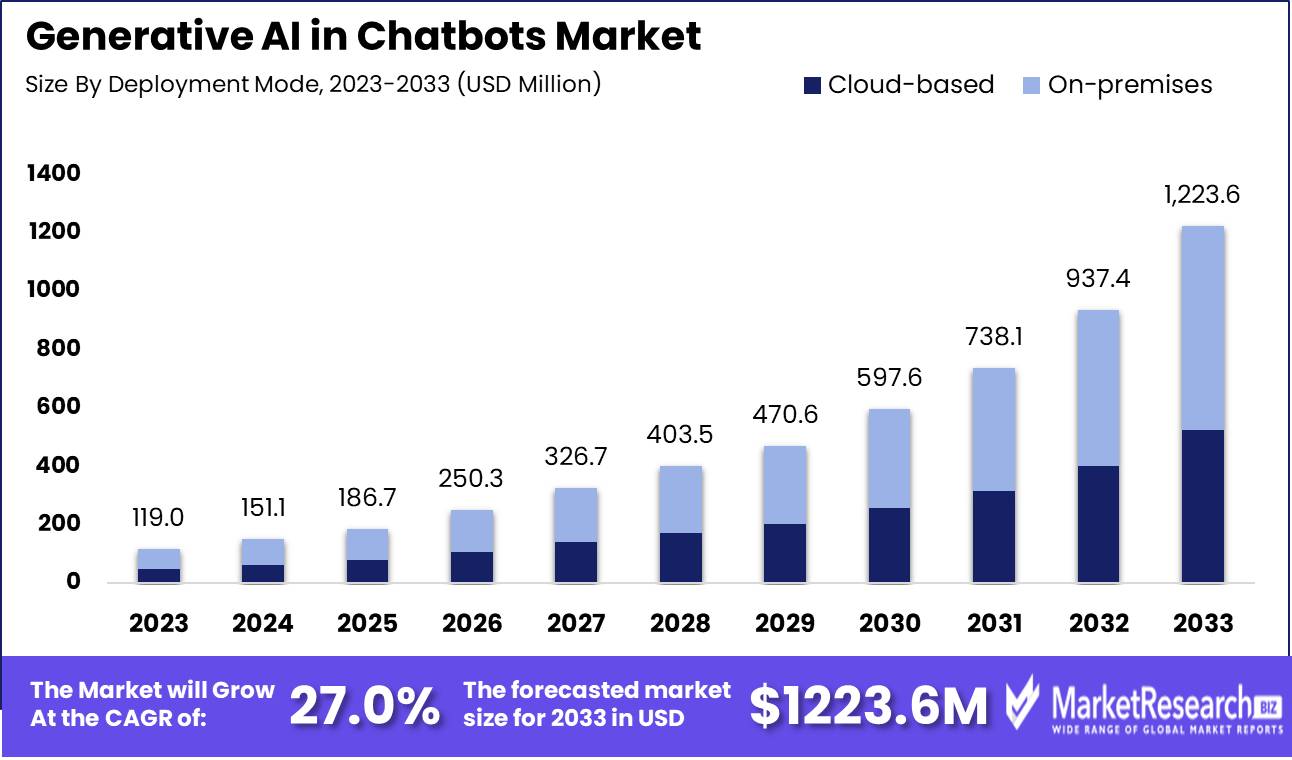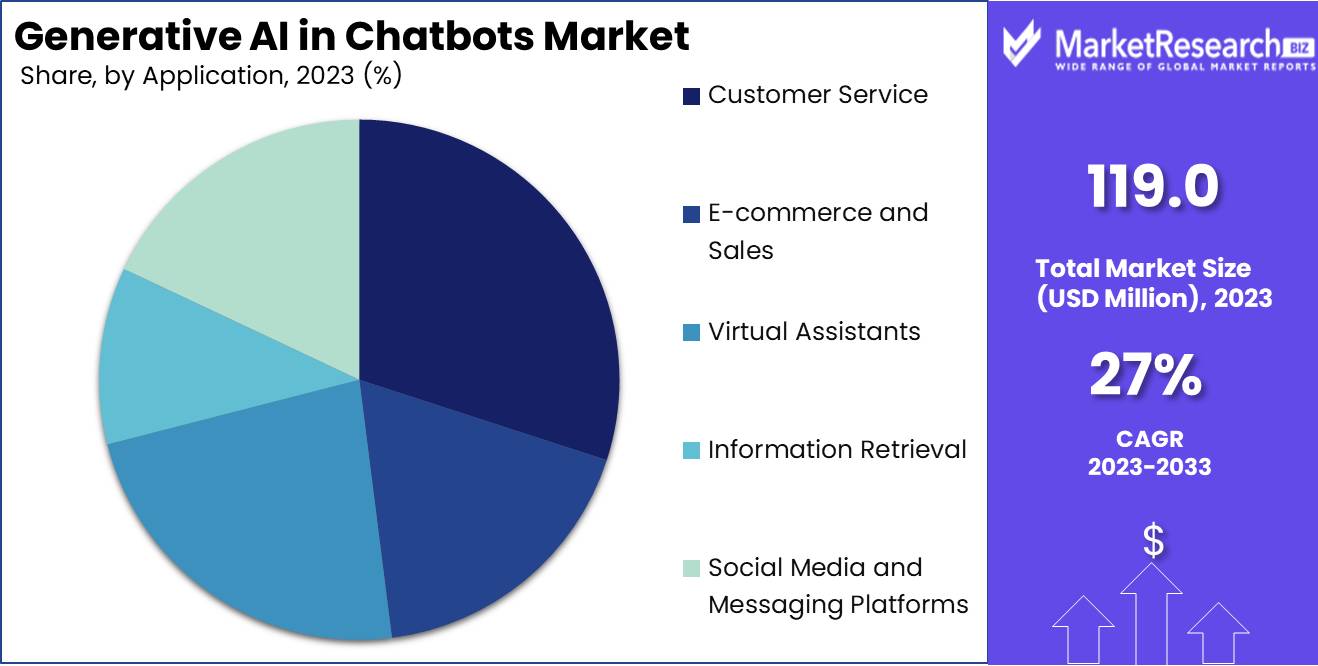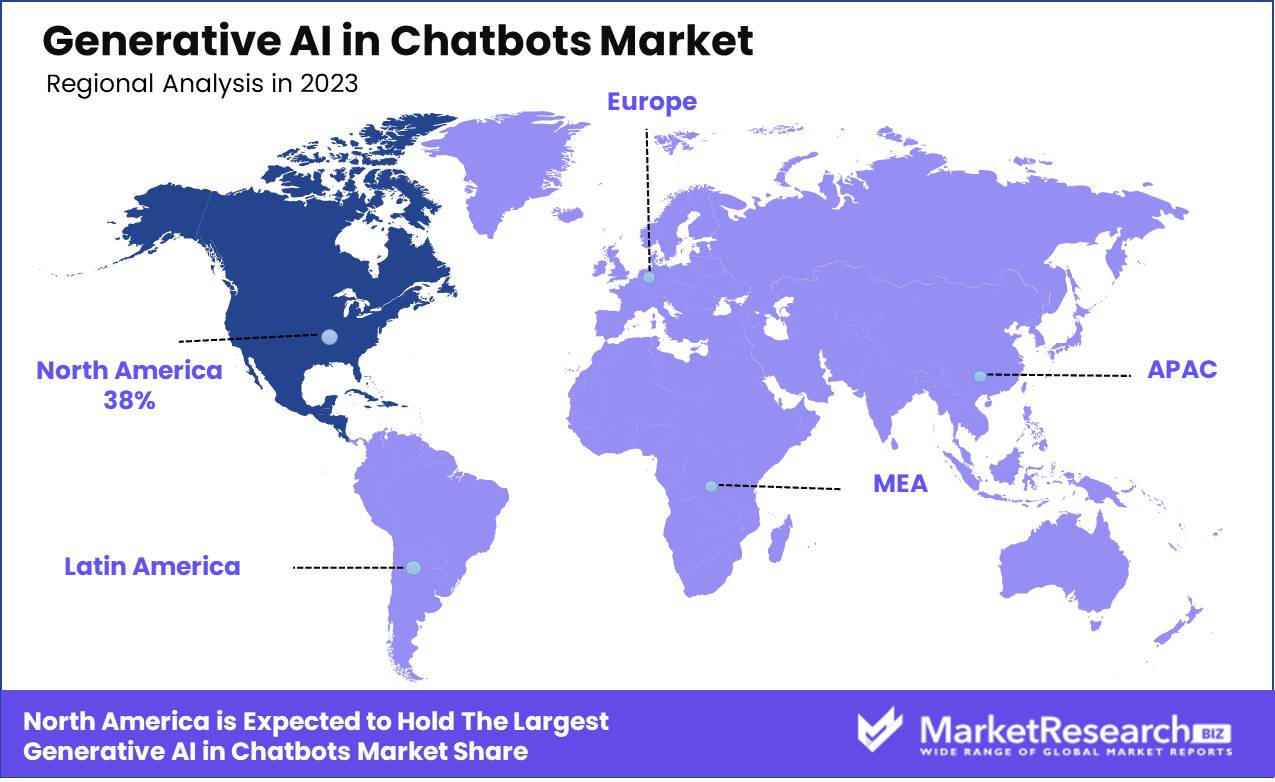
Generative AI in Chatbots Market By Deployment Mode (Cloud-based, and On-premises), By Application (Customer Service, E-commerce and Sales, Virtual Assistants), By Industry (Retail and E-commerce, Banking and Finance, Healthcare, and Others), By Region and Companies - Industry Segment Outlook, Market Assessment, Competition Scenario, Trends, and Forecast 2024-2033
-
39008
-
April 2024
-
300
-
-
This report was compiled by Vishwa Gaul Vishwa is an experienced market research and consulting professional with over 8 years of expertise in the ICT industry, contributing to over 700 reports across telecommunications, software, hardware, and digital solutions. Correspondence Team Lead- ICT Linkedin | Detailed Market research Methodology Our methodology involves a mix of primary research, including interviews with leading mental health experts, and secondary research from reputable medical journals and databases. View Detailed Methodology Page
-
Quick Navigation
Report Overview
The Generative AI in Chatbots Market size is expected to be worth around USD 1,223.6 Mn by 2033 from USD 119.0 Mn in 2023, growing at a CAGR of 27% during the forecast period from 2024 to 2033.
The surge in demand for messenger applications and new advanced technologies are some of the main key driving factors for the generative AI in the chatbot market. GenAI in chatbots has gained a substantial presence in multiple sectors comprise customer services, healthcare, finance, e-commerce, healthcare, and education. This AI-driven chatbot uses advanced ML methods like deep learning and natural language processing to produce similar human responses and interact in meaningful conversations with the users. They have become an important asset for automating monotonous tasks that offer quick assistance and improve customer experience.

According to a report published by MarketSplash in November 2023, the global market for the chatbot will be valued at around USD 1 billion in 2023. There are a total of 32% of individuals who see chatbots mainly as equipment for getting instant responses to their queries. For 66% of millennials, the chatbot offers 24x7 services as it is the most substantial advantage. By the end of 2023, ChatGPT will produce a market revenue of USD 200 million. Most of the companies are already using chatbots such as 23% belong to customer service companies and more than 80% of the companies have integrated conversational marketing solutions. Moreover, in 2022, ASAPP got the highest investment among AI chatbots which has a value of about USD 380 million. These chatbots can provide answers to 80% of all the basic queries. In 2022, 60% of individuals have engaged with a chatbot. The daily usage of chatbots is reported to be 40% of millennials. Additionally, there are more than 300,000 chatbots which are available on Facebook Messenger. However, 33% of consumers prefer using chatbots to make hotel or restaurant reservations.
There are several advantages of using GenAI in chatbots such as it improvises creativity by producing novel and contextually appropriate solutions which results in engaging and creative conversation with the users. This technology also helps in optimizing contextual understanding as GenAI models can analyze the perspective of a conversation more systematically which leads to more précised and relevant responses. With the help GenAI chatbot, the interaction between the chatbot and the human is a more natural conversation. These also help in data collection and analysis, help in customization, boost efficacy, and generate leads. GenAI chatbot also helps in up-selling and cross-selling products based on the customer’s preferences. The demand for GenAI in chatbots will rapidly increase due to its requirements in various industries that will help in market expansion during the forecasted period.
Key Takeaways
- Market Growth: The Generative AI in Chatbots Market size is expected to be worth around USD 1,223.6 Mn by 2033 from USD 119.0 Mn in 2023, growing at a CAGR of 27% during the forecast period from 2024 to 2033.
- By Deployment Mode: In 2023, cloud-based AI chatbots dominated with over 60% market share, outpacing on-premises deployments.
- By Application: In 2023, the Customer Service segment led the Generative AI Chatbots Market with a 29% share.
- By Industry: AI-driven chatbots in retail enhance customer service, boost sales, and streamline operational efficiency.
- Regional Dominance: North America leads the generative AI chatbot market with a 38% share, followed by rapid growth in Asia Pacific.
- Growth Opportunity: Generative AI in chatbots enhances personalization and data-driven decisions, boosting engagement and operational efficiency.
Driving factors
Enhanced Customer Support: Elevating Efficiency and Engagement
The deployment of generative AI in chatbots significantly enhances customer support by streamlining interactions and providing rapid, accurate responses to user inquiries. This technology allows companies to manage a higher volume of customer queries without a corresponding increase in human resources, leading to substantial cost savings and improved operational efficiencies. Generative AI-equipped chatbots can understand and respond to complex customer needs in real-time, ensuring a more personalized experience. The availability of 24/7 support through these AI systems also increases customer satisfaction and loyalty.
Statistically, businesses implementing AI in customer support have seen up to a 30% reduction in costs and an improvement in response times by over 80%. This not only optimizes the customer experience but also frees up human agents to handle more complex issues, thereby enhancing overall productivity. The market for AI in customer support is projected to grow at a CAGR of approximately 25% over the next five years, indicating strong adoption and integration trends across industries.
Algorithmic Trading Strategies: Enhancing Market Responsiveness and Profitability
Generative AI plays a transformative role in financial services through the application of advanced algorithmic trading strategies. By leveraging AI, financial institutions can create models that predict market trends and execute trades at optimal times, maximizing profitability. The artificial intelligence algorithms are capable of analyzing vast datasets far more quickly than human traders, identifying opportunities that would be otherwise missed.
In the realm of algorithmic trading, AI chatbots contribute by facilitating real-time interaction and providing traders with instant insights based on market changes and historical data analysis. These bots can simulate numerous trading scenarios to forecast outcomes, helping traders to make more informed decisions. The use of AI in algorithmic trading is expected to increase efficiency in trade execution and reduce instances of human error, with the algorithmic trading market anticipated to expand at a CAGR of around 11% through 2027.
Portfolio Management Optimization: Driving Personalization and Risk Management
Generative AI significantly enhances portfolio management by enabling personalized investment strategies tailored to individual risk profiles and financial goals. AI-driven chatbots can interact with clients to understand their preferences and provide recommendations based on sophisticated risk assessment algorithms and predictive analytics. This capability allows for dynamic portfolio adjustments based on real-time market conditions and client input, optimizing potential returns while managing risk exposure.
The integration of AI into portfolio management not only improves decision-making processes but also enhances client engagement by providing a highly interactive and responsive advisory service. As financial markets continue to evolve, the reliance on AI for portfolio management is expected to grow, supporting the trend towards more automated, data-driven investment platforms.
Restraining Factors
Navigating Misinformation and Security Risks: Enhancing Trust and Market Expansion
The growing incorporation of Generative AI in chatbots has significantly elevated the potential for misinformation and security risks. These challenges stem primarily from the ability of AI models to generate content that can be indistinguishable from human input, raising concerns about the dissemination of false information and the manipulation of these technologies for malicious purposes. The concern is not unfounded, as a study by the research revealed that over 40% of organizations noticed their AI systems making unreliable or unsafe decisions due to AI behavior mimicking internet training sources. This has profound implications for market growth as users and regulatory bodies demand more secure and reliable systems.
In response, companies in the AI chatbot sector are increasingly investing in sophisticated machine learning algorithms that can discern and mitigate potentially harmful or misleading outputs. This retraining to handle misinformation not only combats the immediate threats but also serves as a significant market growth driver. By emphasizing the development of secure, trustworthy systems, businesses can enhance their market appeal and customer trust, thereby supporting expansion. Investments in security protocols and AI ethics also foster a more stable environment for market growth, as they align with global calls for safer AI interactions.
Overcoming Regulatory Challenges: Fostering Innovation Through Compliance
Regulatory challenges constitute a significant retraining factor for the Generative AI in the chatbot market. As governments around the world begin to understand the implications of AI in consumer and business applications, they are instituting frameworks to manage these technologies. The European Union’s Artificial Intelligence Act is one such example, aiming to set guidelines on AI usage that could affect global markets. These regulations are often designed to protect users from privacy invasions, biased algorithms, and other risks, yet they also impose restrictions on how AI can be deployed and developed.
The dual nature of regulatory challenges means that while they can constrain some aspects of AI applications, they also spur innovation within the industry. Companies are required to innovate not only technologically but also in their compliance and governance structures to align with new laws. This retraining and restructuring effort can be a substantial financial burden in the short term, but it also opens up new markets and customer segments that are sensitive to compliance and data security. Furthermore, by adhering to these regulations, companies can avoid costly penalties and gain competitive advantages through enhanced reputation and trust among stakeholders.
By Deployment Mode Analysis
In 2023, cloud-based AI chatbots dominated with over 60% market share, outpacing on-premises deployments.
In 2023, the Generative AI in the Chatbots Market witnessed significant trends across different deployment modes, with cloud-based solutions taking a leading position. Capturing more than 60% of the market share, cloud-based deployment demonstrated its dominant role, driven by its scalability, ease of integration, and reduced upfront costs which align with the operational needs of modern enterprises. This segment's robust growth is further fueled by the increasing adoption of AI technologies that require substantial computational power and data storage capabilities that are readily available in cloud environments.
Conversely, the on-premises segment, while smaller, maintains a critical role, particularly in industries where data security and regulatory compliance are paramount. This segment appeals to organizations that prioritize direct control over their chatbot systems and data, despite the higher initial investments and ongoing maintenance costs associated with on-premises infrastructure.
By Application Analysis
In 2023, the Customer Service segment led the Generative AI Chatbots Market with a 29% share.
In 2023, Customer Service held a dominant market position in the "Based on Application" segment of the Generative AI in Chatbots Market, capturing more than a 29% share. This leadership is attributed to the increasing demand for efficient and scalable customer interaction solutions across various industries. Businesses have recognized the value of leveraging AI-driven chatbots to enhance customer experience, reduce response times, and manage higher volumes of queries effectively. This segment's growth is propelled by significant advancements in natural language processing and machine learning, enabling chatbots to provide more accurate and contextually relevant responses.
Following Customer Service, other key segments include E-commerce and Sales, Virtual Assistants, Information Retrieval, and Social Media and Messaging Platforms. Each segment utilizes generative AI to cater to specific operational needs and consumer expectations. For instance, E-commerce and Sales platforms integrate these AI capabilities to personalize shopping experiences and optimize sales processes. Meanwhile, Virtual Assistants focus on automating and streamlining user interactions across various digital platforms, enhancing both efficiency and user satisfaction. As businesses continue to adopt these technologies, the generative AI chatbots market is expected to evolve, with a growing emphasis on hyper-personalization and user engagement.

By Industry Analysis
AI-driven chatbots in retail enhance customer service, boost sales, and streamline operational efficiency.
In 2023, Retail and E-commerce held a dominant market position in the Generative AI in Chatbots Market, a pivotal segment of the evolving digital commerce landscape. This sector's embrace of generative AI technologies has transformed customer interactions, providing a highly personalized shopping experience that is both scalable and efficient. Retailers leveraging AI-driven chatbots have seen significant improvements in customer service and engagement, which in turn have driven increased sales and customer loyalty.
The integration of generative AI in e-commerce platforms has enabled businesses to automate responses to customer inquiries, provide tailored recommendations, and streamline the purchasing process. These advancements have not only enhanced customer satisfaction but also reduced operational costs by minimizing the need for extensive human customer service teams. Furthermore, the ability to analyze vast amounts of consumer data with AI allows for more accurate predictions of purchasing trends and behavior, enabling retailers to optimize their inventory and marketing strategies effectively.
As the retail and e-commerce industry continues to evolve, the strategic deployment of AI chatbots stands as a critical factor in maintaining competitive advantage. Companies that innovate and adapt to incorporate these technologies are likely to see sustained growth and success in an increasingly digital market environment. This trend underscores the importance of continued investment in AI capabilities to meet changing consumer expectations and drive business transformation.
Key Market Segments
Based on the Deployment Mode
- Cloud-based
- On-premises
Based on Application
- Customer Service
- E-commerce and Sales
- Virtual Assistants
- Information Retrieval
- Social Media and Messaging Platforms
Based on Industry
- Retail and E-commerce
- Banking and Finance
- Healthcare
- Travel and Hospitality
- Telecom and IT
- Other industries
Growth Opportunity
Personalized Content Creation: Enhancing User Engagement
The integration of Generative AI into chatbots represents a transformative leap forward in personalized content creation. As we enter 2024, businesses are poised to leverage these advanced AI capabilities to deliver highly customized interactions. Generative AI enables chatbots to generate content that is not only contextually relevant but also tailored to the individual preferences and historical interactions of user preferences. This personalization can significantly enhance user engagement and satisfaction, driving higher conversion rates and loyalty. For companies, the strategic deployment of AI-powered chatbots can translate into a competitive edge, particularly in sectors like retail, banking, and customer service where personalization is a key differentiator.
Data-Driven Decision-Making: Optimizing Operational Efficiency
Generative AI also excels in harvesting and utilizing vast amounts of data to support decision-making processes. This capability will allow businesses to not only automate responses but also to analyze customer data and feedback in real time. This analysis can inform product development, marketing strategies, and customer service enhancements, leading to more informed and strategic business decisions. For the chatbot market, the ability to process and act on data-driven insights efficiently means better customer interactions and optimized operational performance.
Latest Trends
Enhanced Conversational Abilities
The global generative AI in chatbots market is poised for transformative growth, primarily driven by significant advancements in natural language processing (NLP) technologies. Chatbots are expected to exhibit enhanced conversational abilities, closely mimicking human interactions. This trend is catalyzed by the integration of more sophisticated machine learning models and large language datasets, enabling chatbots to understand context and nuance better than ever before.
Businesses are increasingly leveraging these capabilities to provide exceptional customer service, reduce operational costs, and personalize user experiences. The deployment of more advanced conversational agents is projected to increase customer engagement and satisfaction across various digital platforms, thereby boosting the adoption of AI-driven solutions in customer-centric industries such as retail, banking, and healthcare.
Integration with Virtual and Augmented Reality
The integration of generative AI chatbots with virtual reality (VR) and augmented reality (AR) technologies is set to redefine user interactions in digital environments. This synergy is anticipated to create highly immersive and interactive experiences, particularly in sectors like e-commerce, education, and real estate. For instance, AI-powered chatbots in VR settings could guide users through virtual stores, offering personalized shopping advice and handling queries instantaneously.
Similarly, in educational contexts, AR chatbots could enhance learning by providing real-time information and assistance, effectively acting as interactive guides through augmented lesson plans. This integration not only enriches the user experience but also opens up new avenues for businesses to engage with consumers in a more meaningful and impactful way.
Regional Analysis
North America leads the generative AI chatbot market with a 38% share, followed by rapid growth in Asia Pacific.
In the rapidly evolving landscape of generative AI in chatbots market, regional dynamics display distinct characteristics and growth trajectories. North America leads the market, commanding a dominant share of 38%. This region's supremacy is underpinned by robust technological infrastructure, high digital literacy rates, and significant investments from major tech companies headquartered in Silicon Valley and other tech hubs. The integration of AI in customer service and enterprise operations has been extensively adopted, driving North American market growth.

Europe follows, showcasing strong growth driven by stringent data protection regulations that foster innovations in secure AI chatbot applications. The market benefits from collaborative efforts between the public sector and tech giants to promote AI integration in various industries.
In the Asia Pacific, the market is experiencing rapid expansion due to the increasing penetration of internet services and smartphone usage, coupled with significant investments in AI by countries like China, Japan, and South Korea. This region is poised for substantial growth, attributed to its large, tech-savvy population demanding sophisticated customer interaction solutions.
The Middle East & Africa, and Latin America regions, although smaller in market size, are witnessing growing adoption of AI chatbots, facilitated by digital transformation initiatives and the increasing need for automation and efficient customer service solutions in businesses. These regions offer considerable growth potential as emerging markets with increasing technological adoption.
Key Regions and Countries
North America
- The US
- Canada
- Rest of North America
Europe
- Germany
- France
- The UK
- Spain
- Netherlands
- Russia
- Italy
- Rest of Europe
Asia-Pacific
- China
- Japan
- Singapore
- Thailand
- South Korea
- Vietnam
- India
- New Zealand
- Rest of Asia Pacific
Latin America
- Mexico
- Brazil
- Rest of Latin America
Middle East & Africa
- Saudi Arabia
- South Africa
- UAE
- Rest of the Middle East & Africa
Key Players Analysis
The global Generative AI in the Chatbots Market is expected to be significantly shaped by the activities and innovations of key players such as OpenAI, IBM Watson, Microsoft Bot Framework, and Amazon Lex, among others. OpenAI, with its advanced language models, continues to lead in cutting-edge technology, providing robust frameworks that enable more nuanced and context-aware chatbots. IBM Watson leverages its strong legacy in AI and deep learning to offer solutions that are particularly effective in complex, enterprise-level applications where understanding industry-specific needs and data security are paramount.
Microsoft’s Bot Framework and Amazon Lex both capitalize on their expansive cloud infrastructure to integrate seamlessly with other services, enhancing the scalability and accessibility of AI chatbots across various platforms and applications. These players demonstrate a clear focus on making AI more adaptable and integrated within business processes.
Emerging players like Rasa and Botpress are crucial in democratizing AI chatbot technology, offering open-source frameworks that empower smaller developers to create sophisticated AI-driven interactions. LivePerson and Ada Support focus on customer engagement through AI chatbots, enhancing user experience with more personalized and contextually relevant interactions.
The landscape is also characterized by specialized firms like Kore.ai and Artificial Solutions, which tailor AI chatbot functionalities to niche markets, thus broadening the scope and applicability of generative AI technologies across different industries.
Market Key Players
- OpenAI
- IBM Watson
- Microsoft Bot Framework
- Amazon Lex
- Chatfuel
- LivePerson
- Rasa
- Botsify
- ai Software India Pvt Ltd
- Nuance India Pvt Ltd
- Artificial Solutions
- Ada Support
- Botpress
- Other Key Players
Recent Development
- In April 2024, Meta Platforms unveiled new AI systems, including the Meta AI assistant, with impressive capabilities but also showcased bizarre behavior, exposing the limitations of generative AI. The company aims to make its AI the most useful assistant but faces challenges in fine-tuning safety and social behavior.
- In February 2024, Sierra, led by OpenAI Chairman Bret Taylor launched with a focus on developing AI chatbots for business applications, raising $110 million and securing key partnerships with companies like WeightWatchers and Sonos.
Report Scope:
Report Features Description Market Value (2023) USD 119.0 Mn Forecast Revenue (2033) USD 1,223.6 Mn CAGR (2024-2032) 27% Base Year for Estimation 2023 Historic Period 2016-2023 Forecast Period 2024-2033 Report Coverage Revenue Forecast, Market Dynamics, COVID-19 Impact, Competitive Landscape, Recent Developments Segments Covered By Deployment Mode (Cloud-based and On-premises), By Application (Customer Service, E-commerce and Sales, Virtual Assistants, Information Retrieval, and Social Media and Messaging Platforms), By Industry (Retail and E-commerce, Banking and Finance, Healthcare, Travel and Hospitality, Telecom and IT, and Other Industries) Regional Analysis North America - The US, Canada, Rest of North America, Europe - Germany, France, The UK, Spain, Italy, Russia, Netherlands, Rest of Europe, Asia-Pacific - China, Japan, South Korea, India, New Zealand, Singapore, Thailand, Vietnam, Rest of Asia Pacific, Latin America - Brazil, Mexico, Rest of Latin America, Middle East & Africa - South Africa, Saudi Arabia, UAE, Rest of Middle East & Africa Competitive Landscape OpenAI, IBM Watson, Microsoft Bot Framework, Amazon Lex, Chatfuel, LivePerson, Rasa, Botsify, Kore.ai Software India Pvt Ltd, Nuance India Pvt Ltd, Artificial Solutions, Ada Support, Botpress, and Other Key Players Customization Scope Customization for segments, region/country-level will be provided. Moreover, additional customization can be done based on the requirements. Purchase Options We have three licenses to opt for Single User License, Multi-User License (Up to 5 Users), Corporate Use License (Unlimited User and Printable PDF) -
-
- OpenAI
- IBM Watson
- Microsoft Bot Framework
- Amazon Lex
- Chatfuel
- LivePerson
- Rasa
- Botsify
- ai Software India Pvt Ltd
- Nuance India Pvt Ltd
- Artificial Solutions
- Ada Support
- Botpress
- Other Key Players




